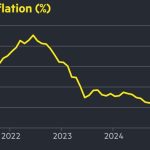Receive free Corporate governance updates
We’ll send you a myFT Daily Digest email rounding up the latest Corporate governance news every morning.
Johnny Taylor, independent director at logistics company XPO, said a “hot topic” at a gathering of board members in New York this week — beyond the impact of shareholder activism, cyber threats and artificial intelligence — was Bernard Looney’s abrupt resignation as BP chief executive.
Looney’s departure over the non-disclosure of past relationships with colleagues has returned boards’ focus to the reputational risks raised by romantic and sexual relationships at work, particularly when they involve the chief executive.
Boards are increasingly “distinguishing between what’s acceptable for the average employee and what will be acceptable for executives, in particular CEOs and members of the C-suite”, said Taylor, who is chief executive of the US Society for Human Resource Management (SHRM).
Directors now habitually ask candidates for chief executive roles “Have you been, or are you currently, in a relationship with someone who works here? If so, then you have to disclose it and then we as a business can go in [to the executive appointment] eyes wide open”, he added.
Looney is not the first and will not be the last chief to be felled for failing adequately to disclose liaisons with staff.
Last year, Jeff Zucker had to resign as president of cable news network CNN Worldwide after a separate investigation revealed his consensual relationship with Allison Gollust, then CNN’s chief marketing officer.
“I was required to disclose it when it began but I didn’t. I was wrong,” Zucker wrote in a memo announcing his resignation.
McDonald’s chief executive Steve Easterbrook was fired in 2019 after failing to admit to what he originally said was a single consensual relationship.
The fast-food company later alleged Easterbrook had engaged in three other sexual relationships with employees and had approved a six-figure stock grant to one of the women involved. Following Securities and Exchange Commission charges for misleading investors, Easterbrook paid a $400,000 civil penalty and consented to a five-year officer and director ban. The scandal intensified scrutiny of problems with the corporate culture of McDonald’s.
Taylor said it was the threat of wider reputational damage as much as the legal risk that was driving boards to ban chief executives from starting new relationships with colleagues once in office.
Boards were “not asking [chief executives] to take a vow of celibacy”, he said. Instead, they were saying: “There are 335mn people in America, and if [the company] has 50,000 employees, 50,000 are off limits.”
The #MeToo movement to expose sexual harassment at work directed attention to inappropriate relationships and potential abuse of power by senior executives over their juniors. But, by definition, even a consensual relationship between a chief executive and another staff member represents a power imbalance.
“Where the relationship is functioning well, third parties are quick to assume an element of favouritism will creep into salary and promotion decisions,” said Meriel Schindler, head of the employment team at law firm Withersworldwide. “If the relationship has gone sour, the aggrieved party may well assume that this has caused decisions not to go their way.”
Joan Williams, a law professor at the University of California San Francisco, said there were always repercussions for work. “This isn’t just a private decision of two adults. These two adults are in a workplace where their private decision could have an impact on workplace culture and on other adults around them,” she said. Even with consent, “it poisons the atmosphere”.
She added that in most heterosexual workplace relationships involving senior executives, the higher-ranking member of the couple is still a man. When the relationship is disclosed, “if someone’s career is going to get hurt, it’s usually the woman’s”.
Zucker, Easterbrook and Looney all breached corporate policies and protocols that required them to disclose their relationships. Some companies have a strict “no dating colleagues” policy.
Brian Krzanich resigned as chief executive of technology company Intel in 2018 after violating a “non-fraternisation” code that applied to managers. But the problem with strict policies was that “human beings are human and the risk is that you drive these things underground”, said Williams.
That helps explain the growing distinction between stricter policies applied at executive level and the more permissive approach used for junior ranks. Facebook parent Meta, for instance, allows staff to ask colleagues out, but not to ask again if the date is declined to minimise the risk that an invitation escalates into harassment.
A SHRM survey in February suggested 27 per cent of US workers are in, or have been in, a workplace relationship. That figure has stayed more or less steady through the pandemic and lockdowns, even though more remote work reduces the opportunity for office romance. About 18 per cent of British workers met their current or most recent partner at work, according to a pre-pandemic survey by YouGov, the same proportion as through mutual friends.
“People date at work and only a few of those people are ever going to become CEOs,” said Taylor. But for that rarefied few, he added, directors’ attitudes are tightening. “Anything that calls into question or compromises the company’s reputation and goodwill is unacceptable.”
Read the full article here












